

Encyclopedia Dubuque
"Encyclopedia Dubuque is the online authority for all things Dubuque, written by the people who know the city best.”
Marshall Cohen—researcher and producer, CNN
Affiliated with the Local History Network of the State Historical Society of Iowa, and the Iowa Museum Association.
WESTERN STAGE COACH COMPANY

WESTERN STAGE COACH COMPANY. The Western Stage Coach Company was the primary source of transportation for Dubuque residents in the 1850s and 1860s. (1) The company was established in 1854 with a capital investment of $1.5 million, according to the Davenport Democrat and Leader. Among the investors from Iowa were Kimball Porter from Iowa City and Col. E.F. Hooker from Des Moines. The Des Moines headquarters were located in the Everett House at Fort Des Moines. Shops and barns at 8th and Vine streets housed five departments: woodworking, iron works, painting, horse shoeing and harness making. There was also a large station at Iowa City where the company kept supplies, coaches, horses, blacksmith and carpenter shops. (2)
The company quickly scheduled stage routes throughout Iowa as well as into Nebraska, Wisconsin and Missouri. (3) Fares ranged from five to seven cents per mile. The Knoxville Journal reported that receipts for one year on the line between Des Moines and Boone reached $100,000. (4)
Using Concord coaches with oval bodies painted in bright colors and named for well-known people or places, the stages—called jerkies—held nine passengers. Painted in bright colors and named for well-known people or places, the Concord coaches—called jerkies—held nine passengers. Each coach, pulled by a team of four horses, was built with heavy straps that served as springs. The pitching and rolling as they traveled the rough roads, however, often threw unfortunate passengers onto the floor of the coach. Making three to four miles per hour in good weather, the stages could be delayed for days in bad weather. The company operated from its offices on Second and Main STREETS in Dubuque. (5)
Two to four horses made up the team. Although good horses were the key to a speedy trip, passengers were often disappointed. The Ames Daily Tribune reported that passengers complained about the “snail-galloping plugs” that pulled their stagecoach out of Vinton. Stages stopped at stations about every ten miles where they got fresh horses, harnessed and ready to go when they arrived. (6)
Developments in river and rail transportation ended the colorful days of the stagecoach. The Western Stage Coach Company, which once served eight midwestern states, closed its Dubuque office in 1870. (7)
---
Source:
1. "Stage Coaches Replaced by Railroads in 1860s," Telegraph-Herald, September 15, 1946, p. 58
2. Mullenbach, Cheryl, "The Rose and Fall of Stagecoaches," IowaWatch.org., May 20, 2017, Online: http://www.iowawatch.org/2017/05/20/stagecoaches-in-iowa/
3. "Stage Coaches..."
4. Mullenbach
5. "Stage Coaches..."
6. Mullenbach
7. Stage Coaches..."